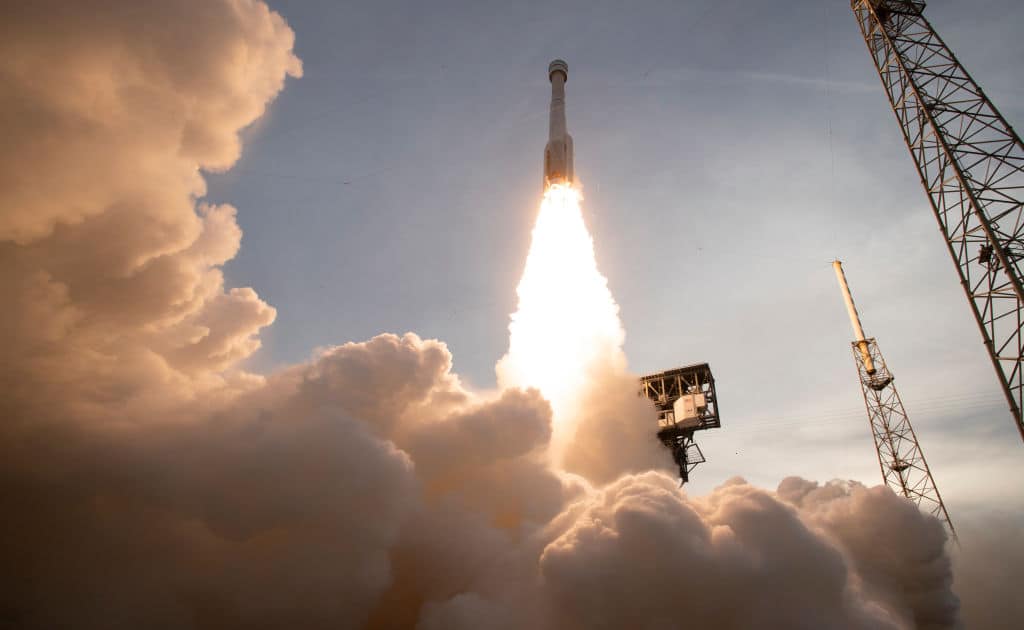Products You May Like
In this handout photo provided by NASA, a United Launch Alliance Atlas V rocket with Boeings CST-100 Starliner spacecraft launches from Space Launch Complex 41 on May 19, 2022 in Cape Canaveral, Florida. Joel Kowsky / NASA / Getty Images
Rockets used for space tourism could potentially have a much bigger effect on the global climate than the operation of traditional aircraft, researchers have found.
Using a 3D atmospheric chemistry model, researchers from University College London (UCL), Massachusetts Institute of Technology and the University of Cambridge examined the stratospheric ozone and climate impact rocket launches and re-entry had in 2019, as well as the effects of predicted space tourism based on the contemporary billionaire space race, according to a UCL press release.
The findings of the research, “Impact of Rocket Launch and Space Debris Air Pollutant Emissions on Stratospheric Ozone and Global Climate,” were published in the journal Earth’s Future.
The research team found that when rockets introduce soot — which is made up of black carbon particles — straight into the upper atmosphere, their heat retention is 500 times greater than the total of all aircraft and surface soot sources, which leads to a much bigger effect on the climate, UCL said.
“Soot particles from rocket launches have a much larger climate effect than aircraft and other Earth-bound sources, so there doesn’t need to be as many rocket launches as international flights to have a similar impact,” said Associate Professor in Physical Geography at UCL Dr. Eloise Marais, who was co-author of the study, as reported by The Independent.
Currently, the total ozone loss from rockets is fairly minor, but projected space tourism growth shows the possibility that the upper stratospheric ozone layer could be further depleted in the spring in the Arctic, since spacecraft contaminants and the heating caused by rocket re-entry are especially damaging to the stratospheric ozone layer, the UCL press release said.
“Rocket launches are routinely compared to greenhouse gas and air pollutant emissions from the aircraft industry, which we demonstrate in our work is erroneous,” Marais said in the press release.
In order to calculate their findings, details on the chemicals from all 103 worldwide rocket launches in 2019 were gathered by the research team, as well as space junk and reusable rocket re-entry data. Expositions by Blue Origin, SpaceX and Virgin Galactic were also used, and the researchers created a future scenario of a robust space tourism industry.
The team found that after only three years of launches by space tourism rockets, the warming caused by the additional emissions was more than twice that of present-day rockets. This is because of the hybrid synthetic rubber fuels used by Virgin Galactic and kerosene used by SpaceX.
“These findings demonstrate an urgent need to develop environmental regulation to mitigate damage from this rapidly growing industry,” the researchers wrote.
The researchers also found that the effect on the stratospheric ozone layer of regular daily or weekly rocket launches associated with space tourism might jeopardize the recovery that resulted from the implementation of the Montreal Protocol — a 1987 ban on ozone-depleting substances, said the UCL press release.
“The only part of the atmosphere showing strong ozone recovery post-Montreal Protocol is the upper stratosphere, and that is exactly where the impact of rocket emissions will hit hardest. We weren’t expecting to see ozone changes of this magnitude,” said UCL Department of Geography Research Fellow Dr. Robert Ryan, who was co-author of the study, as the press release stated. “This study allows us to enter the new era of space tourism with our eyes wide open to the potential impacts. The conversation about regulating the environmental impact of the space launch industry needs to start now so we can minimise harm to the stratospheric ozone layer and climate.”
Subscribe to get exclusive updates in our daily newsletter!
By signing up, you agree to the Terms of Use and Privacy Policy & to receive electronic communications from EcoWatch Media Group, which may include marketing promotions, advertisements and sponsored content. daniel test
